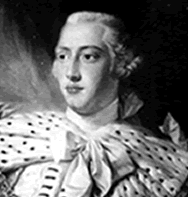King George III

George III (1738-1820): George succeeded his grandfather to the throne, and was the first king of the House of Hanover to command respect among his British subjects. Eventually, his belief that his way was the best way led to friction with statesmen and with the general public. As the King of England and sovereign of the British Empire, King George formally bore the responsibility for the colonial crisis, although in reality, he had little to do with the actual policies involved. King George concurred with the parliamentary provision to tax the colonists to pay for imperial defense. However, he opposed an abrasive approach to the colonies. His support of the Townshend Duties as a symbol of the supremacy of Parliament over the colonies, however, involved him in the issue that set off the Boston Tea Party and the ensuing crisis in 1774 and 1775. His eventual approval of the use of force against the colonists, resulting from his fear that the secession of the colonies would lead to the end of Britain's imperial power, finally facilitated the official beginning of the Revolutionary War. After the Revolutionary, King George supported the official union of Great Britain and Ireland, but refused to allow William Pitt's proposal to emancipate the Roman Catholics. Pitt, who was the object of great dislike on the part of the king, resigned, then resumed office again until his death in 1806. Although George's administrative choices and appointments were less than stellar, and he managed to increase the national debt by a factor of almost six, King George's reign did see a huge expansion of trade and commerce, as well as additional conquests for the empire, despite the loss of the American colonies.
 >
>